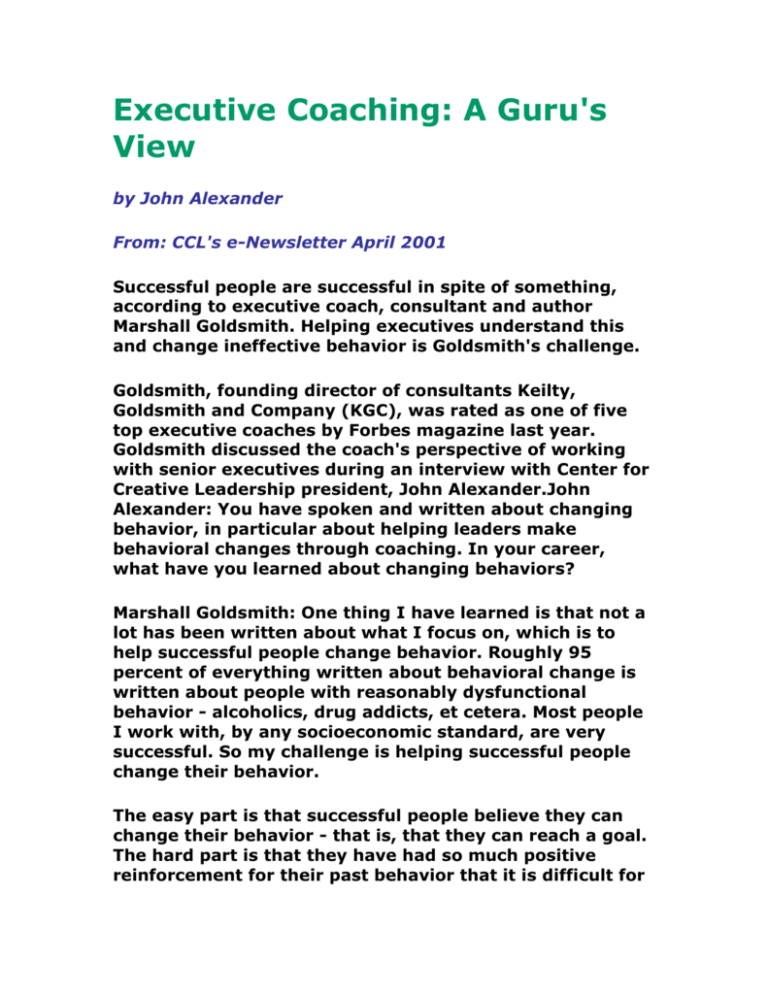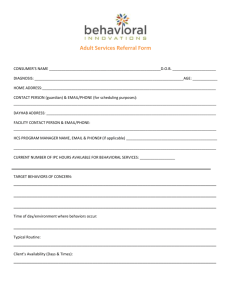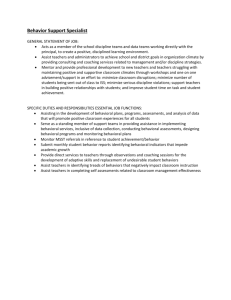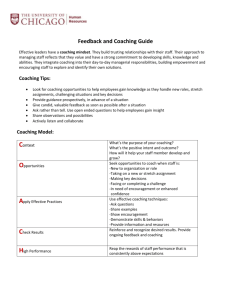Executive Coaching: A Guru`s View
advertisement

Executive Coaching: A Guru's View by John Alexander From: CCL's e-Newsletter April 2001 Successful people are successful in spite of something, according to executive coach, consultant and author Marshall Goldsmith. Helping executives understand this and change ineffective behavior is Goldsmith's challenge. Goldsmith, founding director of consultants Keilty, Goldsmith and Company (KGC), was rated as one of five top executive coaches by Forbes magazine last year. Goldsmith discussed the coach's perspective of working with senior executives during an interview with Center for Creative Leadership president, John Alexander.John Alexander: You have spoken and written about changing behavior, in particular about helping leaders make behavioral changes through coaching. In your career, what have you learned about changing behaviors? Marshall Goldsmith: One thing I have learned is that not a lot has been written about what I focus on, which is to help successful people change behavior. Roughly 95 percent of everything written about behavioral change is written about people with reasonably dysfunctional behavior - alcoholics, drug addicts, et cetera. Most people I work with, by any socioeconomic standard, are very successful. So my challenge is helping successful people change their behavior. The easy part is that successful people believe they can change their behavior - that is, that they can reach a goal. The hard part is that they have had so much positive reinforcement for their past behavior that it is difficult for them to let go of what they perceive has led to this success. I ask them: You are successful because of a lot of reasons, and you are successful in spite of something. What's on the "in spite of" list? Try to improve that. JA: In coaching senior executives, are you typically working on interpersonal behavior? MG: Yes. My area is to help people achieve positive, longterm changes in behavior. Typically, that's interpersonal behavior, not anything else. JA: How do you go about helping people change interpersonal behaviors that aren't working for them? MG: The way I do behavioral coaching is very new. One, I don't get paid if people don't learn. Two, the people who work with the person I am coaching define the new behavior. The person I work with does not define it, and it is not defined by me. If identified behaviors are changed as judged by the stakeholders, I get paid. If they're not changed, I don't get paid. JA: How do you identify those behaviors in the first place? MG: The first thing, before you do any behavioral coaching, is to ask a question: What are the desired behaviors? Second, find out who is in a position to give valid feedback to this person on these behaviors. Third, give them feedback through 360-degree assessments. Fourth, I help them develop the plan for improvement, a plan with a very positive central focus. I used to teach people to pick three areas for behavioral change. Now I say just pick one or two. When I do coaching, I give the person suggestions. I focus my suggestions on the future, not the past. People tend to get upset and defensive and go into denial when you talk about their previous behavior. If you focus on the future, they are much more likely to accept what you say. JA: Is there a key ingredient in someone's changing behavior? MG: One key variable for people being receptive is admitting they have a problem. If someone is not willing to admit his problem, I won't work with him. JA: Let me shift a little bit from the single individual. You also work with hundreds of individuals within one company. How do you make the transition from changing an individual's behavior to helping a company client change multiple behaviors in roughly the same direction for the organization? MG: I start with asking the executives what the behaviors are that they believe will lead to long-term success in their company. Then I ask the company to pick one behavior. You want everybody in the company to get better doing one thing. My job is to help them do a better job of demonstrating those behaviors. If they have given me the right behaviors, this will help their company. Each person gets ongoing follow-up and suggestions on that one behavior. I don't define what the behavior looks like - if I do that, I start discounting what it looks like tothe people who are doing the judging. The people need to be defined by their co-workers or team members, not by me. Behavioral coaching does not fix all leadership problems. I will not do coaching if the following conditions exist: One, the person is unwilling to try. Two, the person is not given a fair chance. Three, their issue is not behavioral; it's intellectual or strategic. Four, their issue is integrity.







